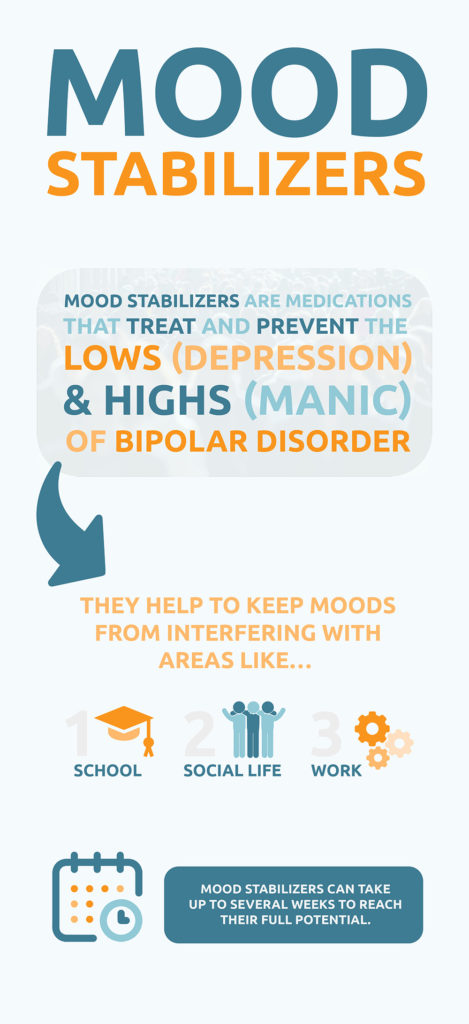A doctor or psychiatrist diagnoses you with bipolar disorder. Now a new challenge lies ahead. You have to start taking mood stabilizers for your disorder. First things first, you’re probably wondering to yourself, how do mood stabilizers work? Deciding on the best medication for bipolar depression or mania feels like when you’re at the eyeglass store seeking a new pair of eyeglasses. It feels nearly impossible but it’s not.
People know bipolar disorder as the mental illness that distorts the human view of oneself and the world. However, discovering the best mood stabilizer can help you to see again. It’s important to note that medications are a vital part of any treatment plan. Even though medications won’t cure you of the mental disorder, they will help you balance your moods so that you can do what you want and need to do. For many, managing bipolar disorder also involves addressing addiction. That’s where drug rehab centers in WV can make a difference.
What Are Mood Stabilizers? How Do Mood Stabilizers Work?
Mood stabilizers are medications that treat and prevent the lows (depression) and highs (mania) of bipolar disorder. You might be asking yourself, “How do mood stabilizers work?” These types of drugs can help reduce your mood swings and prevent depressive and manic episodes. They also help to keep your moods from interfering with the following areas:
- Social life
- School
- Work
When mood swings impact daily life, substance abuse treatment WV may combine therapy and medication to support stability. Mood stabilizers can take up to several weeks to reach their full potential. Due to this reason, people often use other psychiatric medications, such as antipsychotics, in the early stages of bipolar treatment to treat acute mania. Depression in bipolar disorder can be more challenging to differentiate from other forms of depression.
Antidepressant medications have the power to be effective but they should never be used alone with bipolar disorder. They can cause depressed people to transition into mania. Antidepressants can also lead to recurring mood episodes such as rapid cycling.
How Do Mood Stabilizers Work in the Brain?
Mood stabilizers work by decreasing abnormal activity in an individual’s brain. You may wonder, how do mood stabilizers make you feel? For many, they reduce intense mood swings and help create emotional stability.
Examples of Mood Stabilizers

Some of these several drugs include:
- Carbamazepine
- Divalproex
- Lamotrigine
Topiramate and Gabapentin are anticonvulsants that also act as mood stabilizers, but they are typically given in addition to other medications.
Lithium (Lithium Citrate or Lithium Carbonate)
Lithium (Duralith, Lithane, Carbolith) is found in mineral water nature and is also present in tiny amounts of the human body. It’s often prescribed in residential treatment facilities in WV for people struggling with addiction experiencing intense mood episodes. It treats mania symptoms and prevents further episodes of depression and mania.
Common Side Effects of Lithium
- Fine trembling of the hands
- Increased urination and thirst
- Weight gain and nausea
Less Common Side Effects of Lithium
- Slight muscle weakness
- Vomiting and diarrhea
- Difficulty concentrating
- Impaired memory
- Blurred vision
- Skin changes
- Tiredness
These effects are typically mild and generally fade as treatment continues. However, if any of the side effects mentioned are intense, notify your doctor immediately. Kidney and thyroid function has the possibility of being affected by a doctor and should be monitored closely.
Valproic Acid, Valproate, or Divalproex
The varying names of this anticonvulsant medication reflect the numerous ways in which it is formulated. People utilize Divalproex along with its various forms to help treat acute manic episodes. Some of the brand names include Epival and Depakene.
Common Side Effects of Divalproex
- Blurred vision
- Drowsiness
- Dizziness
- Nausea
Less Common Side Effects of Divalproex
- For women, changes in the menstrual cycle
- Vomiting or mild cramps
- Bruising or bleeding
- Muscle tremor
- Liver problems
- Mild hair loss
- Weight gain
Carbamazepine
Carbamazepine, also known as Tegretol, is also an anticonvulsant. It’s sometimes included in care plans at long term drug rehab WV programs to help manage mood instability.
Common Side Effects of Carbamazepine include:
- Increased sensitivity to the sun
- Skin sensitivity and rashes
- Vomiting or mild cramps
- Poor coordination
- Blurred vision
- Muscle tremor
- Confusion
- Drowsiness
- Dizziness
- Nausea
Oxcarbazepine (Trileptal)
This drug is closely related to Carbamazepine. Even though it might have fewer drug interactions and side effects than Carbamazepine, it is not well studied as the best medication for bipolar depression.
Lamotrigine
Lamotrigine, also known as Lamictal, might be the best medication for bipolar depression. However, it’s not nearly as helpful for mania. The beginning dose of Lamotrigine should be extremely low and increased slowly over four weeks or more. This approach can decrease the risk of a severe rash which is potentially an extremely dangerous side effect of the drug.
Common Side Effects of Lamotrigine
- Vomiting or mild cramps
- Headache and skin rash
- Blurred vision
- Drowsiness
- Dizziness
- Nausea
Even though it is rare, a severe skin rash can occur with Lamotrigine. If an individual experiences any rash within the first few weeks of treatment, it should be reported to his or her primary physician.

What Disorders Use Mood Stabilizers?
Are you asking yourself any of the following questions? How do mood stabilizers work? What do mood stabilizers do? Mood stabilizers help treat harmful mood swings such as hypomania, depression, or mania in individuals. They’re often included in medication assisted treatment West Virginia residents trust for people managing both addiction and mood instability.
In other words, mood stabilizers can control or smooth out mood swings.
Mania
The symptoms of mania include the following:
- Engaging in activities you normally wouldn’t that can cause issues such as:
- Making unwise business decisions
- Being more interested in sex
- Spending a lot of money
- Using alcohol or drugs
- Gambling
- Talking extremely quickly, and jumping from one thought to another, racing thoughts
- Making unusual and big decisions without fully thinking them through
- Feeling excited and happy even when things aren’t going well for you
- Struggling to focus on one topic and being easily distracted
- Having the feeling that you don’t want to sleep or can’t sleep
- Thinking that you can do much more than you actually can
- Hearing voices that other people don’t hear
- Moving quickly from one idea to another
- Being full of exciting and new ideas
- Feeling more important than usual
- Being more irritable than normal
- Feeling more familiar with people
Hypomania
Hypomania is extremely similar to mania but you will experience milder symptoms. The treatment for hypomania is also similar to mania.
Depression
The symptoms of depression include the following:
- Being less interested in things you normally used to like doing or enjoying them less
- Feeling negative, hopeless, guilty, helpless, worthless, irritable, or restless
- Difficulty remembering, making decisions, or concentrating
- Gaining or losing weight even when you don’t mean to
- Suicide attempts or thoughts of suicide or death
- Not being able to sleep or sleeping too much
- Feeling less or more hungry than usual
- Having less energy and feeling tired
- Low mood
What Is an Acute Episode?
An acute episode is when hypomania, depression, or mania changes or suddenly gets worse. Some individuals need to take mood stabilizers as a long-term treatment for the acute episodes to stop occurring. You might experience depression or mania if you have the following type of conditions:
- Schizoaffective disorder
- Personality disorder
- Bipolar disorder
- Depression
What Is the Best Mood Stabilizer for Anxiety?
The best mood stabilizer for anxiety disorder is Lamotrigine, or Lamictal. Lamotrigine is commonly prescribed as one of the mood stabilizers for anxiety and depression, especially in bipolar disorder. Many people use this to treat epilepsy. It can come in a dispersible tablet or the form of a tablet. A dispersible tablet means that it would dissolve in water before you take it.
When it comes to bipolar disorder and depression, Lamotrigine is most useful at treating depression and anxiety, instead of mania. It’s important to keep in mind that the term “mood stabilizer” might be misleading for some. If you take one mood stabilizer, your mood can still change throughout the day. These kinds of medications treat full depression and mania episodes that last for several days or weeks at a time.

How Will a Person Know if He or She Needs a Mood Stabilizer?
Are you asking yourself, “Do I need this treatment?” If you suffer from bipolar disorder, medication is the cornerstone of treatment for it. However, combining medication along with other types of support or therapy can help you not only get well but stay well.
Forms of talk therapy help treat bipolar disorder. Examples of these forms of talk therapy are the following:
- Family therapy for addiction and focused education about bipolar disorder
- Social and interpersonal rhythm therapy for addiction
- Cognitive behavioral therapy for substance use disorders
What Else Can Help With Bipolar Disorder?
- Housing and employment support
- Minimizing caffeine and alcohol use
- Getting enough sleep is important
- School and job counseling
- Eating a nutritious diet
- Avoiding street drugs
- Exercising regularly
- Peer support
Do Mood Stabilizers Change People’s Personalities?
The main medication that changes people’s personalities is Paxil, also known as Paroxetine. It is a selective serotonin-reuptake inhibitor (SSRI). People who took Paxil reported feeling less stressed, and more lively, confident, and outgoing.
The belief that antidepressant drugs and SSRIs can create personality changes isn’t a new concept. Many researchers have attributed these changes to the improved mood of the patient. Researchers have though been skeptical if the SSRIs had any independent personality effects on patients.
What Role Does Mood Stabilizers Play in Co-occurring Mental Illnesses?
Mood disorders such as bipolar disorder or depression are two of the most common psychiatric co-occurring mental illnesses among patients with substance use disorders. By treating a patient’s co-occurring mood disorder, that person’s substance craving likely reduces and his or her overall outcome enhanced.
Expanding collaboration and communication between substance abuse and mental health providers is crucial to improving the outcomes for patients with difficult and complex co-occurring mental illnesses.
Stabilize Your Mind at Harmony Ridge Recovery Center WV
Harmony Ridge Recovery Center WV answers the question, “How do mood stabilizers help those struggling with bipolar disorder?” We also answer the questions, “What do mood stabilizers do?,” and “How do mood stabilizers work?” The best medication for bipolar depression is Lamotrigine. With every medication, therapy, and treatment, the most effective way to go about it is through honest feedback and communication.
References:
https://www.camh.ca/en/health-info/mental-illness-and-addiction-index/mood-stabilizing-medication



